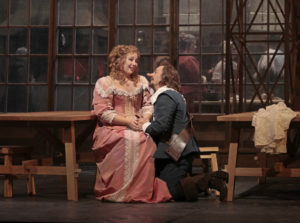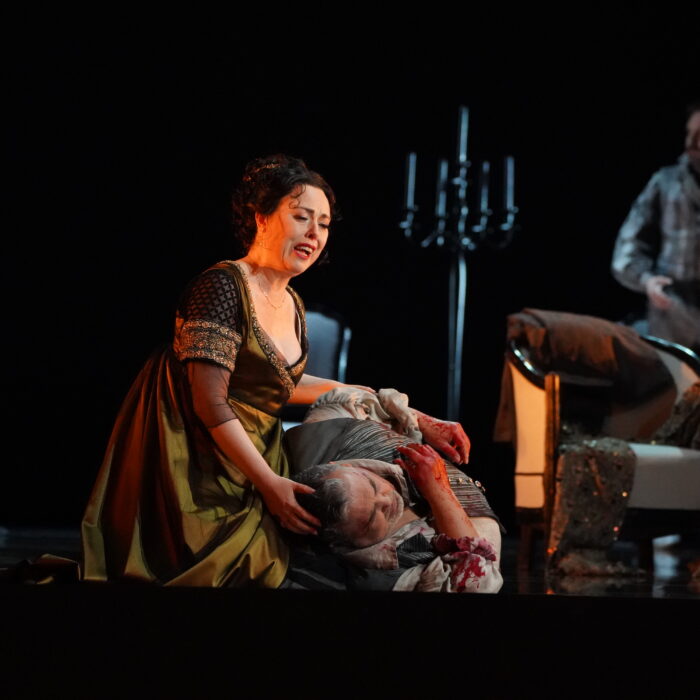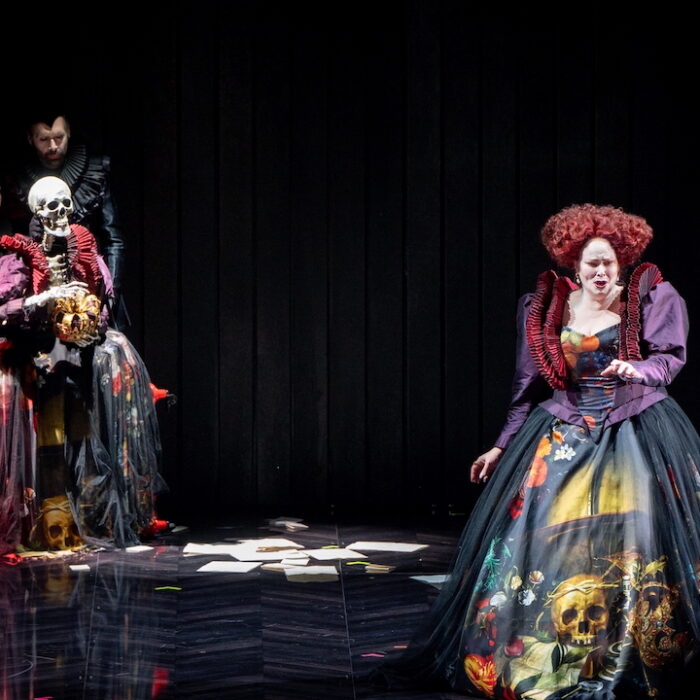
Metropolitan Opera Review 2016-17 – Cyrano de Bergerac: Alagna & Rowley Lead Production Filled With ‘Panache’
By David SalazarFranco Alfano’s “Cyrano de Bergerac” has never truly managed to establish a foothold in the operatic canon. The work only premiered at the Metropolitan Opera in 2005 and Roberto Alagna, the opera’s most dedicated interpreter has stated that he struggled to find a company willing to take a chance on it.
Despite its Italian composer, the music works very much in the vein of Debussy, Alfano eschewing sustained melody in favor of impressionist bursts. The opera rises to riveting emotional highs throughout, but those expecting to come away whistling tunes will find “Cyrano” difficult.
But that isn’t to say that this is not an opera worth re-considering. In fact, its music rises to the level of emotionally sublime in spurts, but its episodic libretto, performed in its full version at the Met for the first time, is what makes a truly compelling case for its viability as a repertoire staple.
Based on the famous Edmond Rostand play of the same name, Henri Cain’s opera shows us the titular hero as a seducer, a brilliant fighter, a poet, a comedian, and yet a man whose insecurity stems from the deformed nose on his face. Cyrano is truly compelling, giving the man in charge of interpreting him a tremendous amount of clay to mold.
A Role & Artist Meant For One Another
In this case, Alagna was that man and he delivered arguably his finest performance at the Metropolitan Opera in years. Alagna’s timbre has always had a nasal quality to it that doesn’t always suit the brighter Italian repertoire he regularly sings. But here it suits the language and the character. Cyrano’s first entrance is off-stage, the tenor admonishing a poor actor on stage with a booming phrase. Here Alagna, despite being nowhere to be seen penetrated the Met auditorium with lush sound, announcing himself as a force to be contended with. And wouldn’t you know it, his gallant entrance, though preceded by his massive nose, supported this notion. Cyrano comes onstage and takes out the actor, proceeds to defeat an opponent in a sword fight while singing one of the famous passages in the work, the aria “Je jette avec grâce mon feutre.” Here Alagna showed off his finesse, every note connected in fluent legato and confident tone, hinting at the ease with which Cyrano dispatched poetry and swordplay. This aria employs a lot of leaps into the vocal stratosphere (as does the entire role), but at the start, Alagna dispatched those ascents with no sign of difficulty. But at each reprise of the main melody, his tenor seemed to grow in strength and intensity, the vibrato stronger, the sound more potent and jumps into the upper range more accentuated, wrapping up a portrait of a fearless and dominant man.
In an ensuing scene, we saw the complete opposite, Cyrano complaining bitterly about his nose as the source of his suffering. Here Alagna, singing in the lower register, imbued his singing with more jagged phrasing, the consonants getting more bite, his tenor losing its luster.
But sure enough, he was back to his vibrant self at the act’s conclusion, his voice, in the high range, blasting through the orchestra with unbridled enthusiasm before going off to fight.
The ensuing act showcased Alagna at his most dynamic dramatically. Jumping from anxiety as he awaited Roxane and wrote her a letter, to hilarious stupefaction as she described her lover (and he continually responded with intensifying “Ahh’s,” to audience laughter and delight) to fierce loyalty as he swore protection for her lover, Alagna continually amazed the viewer as he unraveled newer and fresher layers of this hero.
Of course, the balcony scene is the musical highlight of the opera, Cyrano allowed to express his undying love for Roxanne while disguising himself as her lover Christian. Early on, it was all comedy as Alagna berated poor Christian for his poor language skills and at the outset of the balcony scene, he exaggerated his movements as he tried to teach him the right words to woo Roxanne. But when he finally took over, it was pure rapture. His singing had a delicate quality but slowly growing in intensity. We could feel the sound blossoming into a brighter timbre, the oscillations quicker and the volume spilling into the auditorium with greater weight. As the orchestra grew in its own assertion, so did Alagna, sweeping up in the whirlwind emotions of the character. As the scene draws to its climax and Cyrano watches Christian reap the fruits of his own labor, Alagna threw caution to the wind vocally and sunk to the ground as he lamented his poor fortune.
But the crowning moment of the performance perhaps came at the very end of the opera. 15 years after the previous events, Cyrano appears injured and hurt. Alagna imbued him with a hobbled walk, his vocal color darker and restrained to provide a sense of the character breaking down. The initial conversations with Roxane lacked immediacy and intimacy, the character slowly withering. But as he read the final letter back to her, he sounded rejuvenated, the brilliance of sound from that balcony scene returning and his sound growing in potency. Right before dying, Alagna pushed his vocal resources to their limits in one final act of heroism that brought the opera to a powerful close.
In just two hours, we truly felt that we had gotten to immerse ourselves in the psyche of this character and Alagna is the reason why.
Two Solid Counterpoints
One thing Alfano does extremely well in this opera is to provide perfect counterpoints for the lead character in the form of De Guiche and Christian. And on this night, the casting was spot on.
Both present distinct rivals for the lead character. De Guiche, an old coward who tries to use his position to woo Roxane, saw Juan Jesús Rodríguez in stoic stance all the time. While everyone else seemed to be brimming with life, he took himself all too seriously, his demeanor always serious and even protective. But he was easily undone by the two heroes of the piece, Cyrano, and Roxane. First Roxane toys with him and Rodríguez, who to that point was firm, was like a lapdog chasing after her and begging for her affection. His sound took on light affectations as if he were winning her with sweetness. During the act three confrontation with Cyrano, wherein the hero essentially shows how big a fraud De Guiche is, Rodríguez played up De Guiche’s sense of confidence, pouring all his vocal resources into explaining his brilliant plan and execution. But when Cyrano and his fellow soldiers unmask his cowardice, he fought back, his voice trying to impose itself though now lacking in the wholeness.
On the other side of the spectrum was Atalla Ayan’s Christian, a handsome fellow who is plain and, per his own admission, poor with words. Unlike De Guiche, Christian knows of his shortcomings and admits to them. If we define De Guiche by a misplaced sense of confidence, Christian is defined as lacking it all together. In his interpretation of the cadet, Ayan imbued Christian with charm but hardly passion. As he repeatedly proclaimed his love for Roxane at the start of the balcony scene, Ayan sustained the same exact vocal color, expressing the character’s lacking poetic palette. As Roxane expressed her love for him, confessing that she would love him, despite his looks, Ayan looked away in horror. He attempted to look back at her, but knowing the truth of their situation, he constantly looked around for an outlet of escape.
The Heart of the Production
While Alagna was the centerpiece of the entire production, the reason for its existence and for its overall success, one could argue that the night belonged to Jennifer Rowley as Roxane. Stepping in for Patricia Racette a few weeks before the start of rehearsals, the soprano’s presence in this role, which she was singing for the first time, was one of poise and profound knowledge. She doesn’t actually sing in the entire first act and yet Rowley, placed at the very center of the stage to start the opera, was already a major presence. As she watched the fight unfold, she expressed by the fascination at witnessing the action and fear for the combatants. We could already see that this was no ordinary girl, but one brimming with energy and passion. During her first meeting with Cyrano, Rowley played the coquette, smiling and throwing playful glances at him as she unveiled who she truly loved, her voice relaxed but gentle.
But she showcased a wittier edge as she turned down De Guiche, the soprano ensnaring the older gentleman with a mocking tone and flirtatious glances. When Christian made his failed advances on her, she shut him down with curt and brash phrasing, the building sound expressing her mounting frustration. But then she melted as Cyrano expressed his love for her, the sweet timbre coming to the fore. While Cyrano’s poetry takes center stage, Rowley made us feel Roxane’s wonder. At first, she stood on the balcony in a protective pose, but by the end, her eyes were closed, a massive smile consumed her face and her body ebbed with freedom.
Roxane’s big moment comes in the ensuing act when she appears to greet her lover and then expresses her love in a rapturous aria. Singing in subdued but gentle timbre, the soprano made a slow crescendo throughout the passage, climaxing in her affirmation that she would love Christian even if he was ugly. As the passage develops, the soprano is asked to ascend into the upper range repeatedly, mirroring the writing that Alfano imposes on Cyrano. Rowley was fearless throughout, her dramatic soprano showing its heft, its emotional intensity and its technical security throughout. The high notes burst out with exhilaration resulting in the audience exploding with enthusiasm.
During the final act, Rowley’s Roxane, clothed in a black dress, was far more subdued, the sprightly femme ready to risk it all in the previous acts, now restrained in both manner and vocal expression. But as with Cyrano, her youthful grace and tender singing reasserted itself as she had her moment of realization.
When Rowley came out to take her final bow, the audience thundered with approval. One month ago she had no idea she would be here. As she stood there, tears in her eyes, you couldn’t help but feel excited for her and the future she is poised to have at the world’s greatest stages.
Brilliant Music & Visual Direction
No conductor has shown more dedication to this opera than Marco Armiliato. To this day, he is the only man to conduct the opera at the Metropolitan Opera and his passion for the opera was on full display. The great challenge with this score is that Alfano doesn’t linger much on any particular musical idea, his forward movement making it hard for the listener to latch on to any particular musical thought. But Armiliato, keen on details, ensured that there were some passages that stood out above the others. There’s a passage near the end of the first act in which the strings all come together for fiendishly quick descending scales, a tidal wave of sound that grabbed me and immersed me in this vibrant musical world. The same can go for the glorious cello solo in the balcony scene, the opera’s most melodic passages. The climax of that same balcony scene was also potent for the feeling one had of the orchestra building slowly as if trying to fight through some barrier holding it back. When it finally did manage to overcome said obstacle and assert itself fully, the orchestral sound, along with the three singers, rocked the house. The woodwind ensemble that brought in the wonderful choral passage at the top of Act 3 was also stirring in how it built from a gentle and tender blending of dispersed musical colors into one massive whole.
Finally, Francesca Zambello’s production is yet another example of why she is one of the finest opera directors there is. When the curtains came up on the first act, a massive theater, the audience went into rapture with applause. The details here were stunning with a stage on stage right and the audience boxes lined along the upstage part of the set. This left room for the standing room where some immersive choreography brought about duels and established the distance between Roxane and Cyrano, a motif that would be repeated during the balcony scene.
The production quickly transitioned from that set to a night scene with gorgeous blue lighting. As the opera developed, Zambello’s production stripped down the ornate appeal of the design, each set more and more minimalistic in its approach. Particularly riveting was the transition from the balcony scene to the third act, both sets dominated by a central tower. But while the first tower is Roxane’s balcony and the promise of the love, the second showcases the destroyed soldiers’ barracks, the ultimate site of Christian’s death. While the former “tower” is closer downstage, the latter is all the way upstage. The contrasting colors between the two sets also set the emotional mood. Roxane’s neighborhood is awash in an orange hue while the battlefield is a cold blue, a call out to the night sky in which Cyrano goes to battle.
The final scene in the convent is orange in palette, but barely has any visual identifiers save for an archway, a tree and a few chairs off to the side. This stripped-down imagery sets the stage for Cyrano’s own “stripping down,” the character’s true feelings unveiled moments before his death. The ornate theater world, filled with fake actors was a far cry in this moment and yet, it was impossible not to harken back to that opening scene where Cyrano is literally on stage in front of Roxanne, playing out a role and calling out another actor for being a fraud. Cyrano, Christian and De Guiche are all frauds at some point in the opera, but Cyrano is the one that suffers most for it.
There are still three more performances of “Cyrano de Bergerac” and those interested in seeing the beautiful marriage between music and theater must take a look.
Attendance to this performance on May 2, 2017, was made possible by the Metropolitan Opera Press Department.


